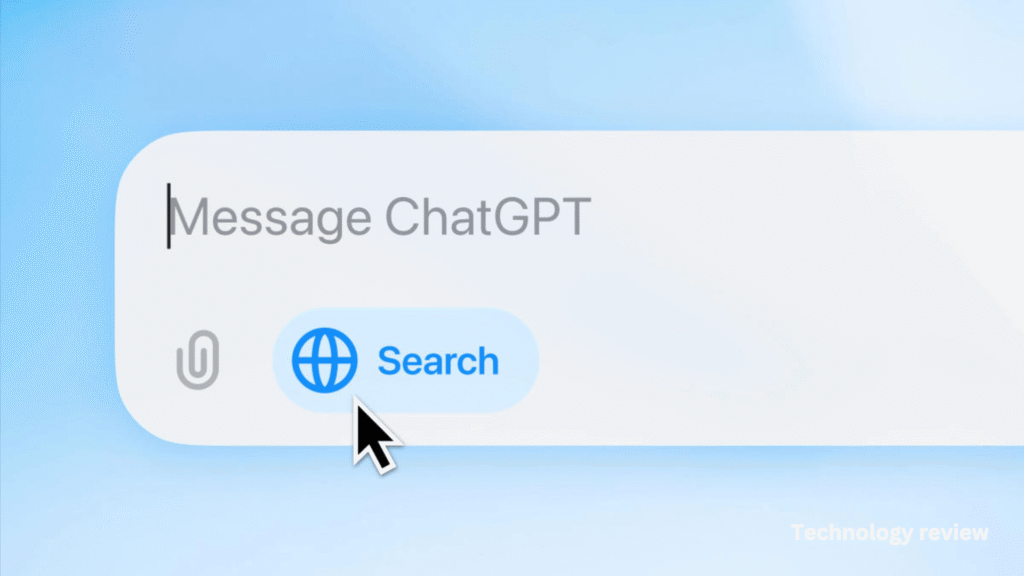OpenAI recently unveiled a groundbreaking update to ChatGPT that integrates live web search, bridging the gap between static, pre-2023 knowledge and real-time data access. This enhancement places OpenAI’s ChatGPT in direct competition with search giants like Google and Microsoft, setting the stage for the next evolution of intelligent AI tools. Meta, too, is reportedly developing its own AI search engine. Through this update, OpenAI aims to empower ChatGPT users with more dynamic, contextually accurate answers drawn from the internet, rather than relying solely on pre-existing training data.
In this article, we explore how OpenAI’s new search function enhances ChatGPT’s capabilities, the competitive implications for major search engines, and the future trajectory of AI-driven search tools. Let’s dive into how this new feature could reshape the digital search landscape, its potential to personalize user experiences, and the challenges that accompany this ambitious endeavor.
The Game-Changing Update: ChatGPT with Web Search Capabilities
Until now, ChatGPT’s responses were largely limited by its last training update in October 2023. With the introduction of web search, OpenAI has changed this limitation, allowing ChatGPT to access up-to-date information, similar to the capabilities of traditional search engines. This feature automatically activates when users pose questions about recent events or data that aren’t available in the model’s static memory.
Key Features of ChatGPT’s Web Search:
- Real-Time Updates: ChatGPT’s web search automatically engages when current information is needed, whether for breaking news, sports updates, or trending topics.
- Natural Language Interaction: The tool allows users to communicate in natural language and receive AI-generated answers, complete with sources and links.
- Contextual Understanding: ChatGPT can maintain context within ongoing conversations, allowing users to explore topics more deeply and follow up with additional questions seamlessly.
These advancements are geared toward making ChatGPT a more intelligent, user-centric tool. The new feature aims to fill in knowledge gaps that previous limitations created and will better serve paying customers, with plans to release it for free users in the near future.
OpenAI vs. Tech Giants: A New Player in the Search Arena
The addition of web search capabilities to ChatGPT squarely places OpenAI in competition with leading search engines. Google, Microsoft, and the emerging AI search company Perplexity have all introduced AI-powered search tools, but each platform offers its own unique interface and approach.
Comparison with Google and Microsoft Bing:
- Google’s AI Summaries: Unlike ChatGPT’s full, AI-powered answers, Google’s AI Overview feature provides a brief, AI-generated summary at the top of the search results, alongside a traditional list of links.
- Microsoft’s Bing AI: Microsoft’s integration of AI into Bing, though advanced, has not significantly shifted market shares. OpenAI’s attempt is another effort to introduce a new kind of search experience.
OpenAI’s ChatGPT search prioritizes creating a more interactive, context-rich search experience, which could help it stand out in this competitive landscape. Experts, however, are skeptical about the immediate impact on Google’s market dominance due to established user habits. For OpenAI, the goal is less about replacing traditional search engines and more about expanding the capabilities of AI-powered search.
Personalization: The Next Frontier in AI-Powered Search
ChatGPT’s new web search capabilities signal the first step toward a more interactive, personalized AI experience. Although the current feature doesn’t retain specific details from previous searches, OpenAI plans to introduce persistent memory in the near future. Persistent memory would allow ChatGPT to recall personalized details—such as a user’s preferences or travel plans—making the interaction more intuitive and highly tailored.
Potential Applications of Persistent Memory:
- User Preferences: ChatGPT could remember user preferences like dietary choices or favorite vacation spots, providing tailored responses in future interactions.
- Contextual Knowledge: With retained knowledge, ChatGPT would be able to deliver better recommendations, for example, suggesting restaurants in a city that a user plans to visit.
- Ongoing Conversations: Users could engage ChatGPT in complex, multi-turn conversations on topics of interest without having to re-establish context.
This level of customization could enhance user satisfaction and increase engagement, as the AI would remember relevant details from previous conversations and deliver even more valuable responses.
A Partnership-Based Approach to Data Access
To ensure accurate, reliable information, OpenAI has formed strategic partnerships with reputable news outlets, including Reuters, The Atlantic, and The Financial Times. This approach aims to ensure ChatGPT’s search results are drawn from credible sources, mitigating the risk of misinformation while providing high-quality content.
How Partnerships Improve Quality:
- Reliable Content: By tapping into established sources, ChatGPT can provide well-sourced, trustworthy information.
- Diverse Perspectives: Access to varied publishers enables a more comprehensive understanding of current events, allowing ChatGPT to offer balanced insights.
- Enhanced User Trust: As misinformation and AI-generated content become more prevalent online, using credible sources can help OpenAI build user confidence in ChatGPT’s answers.
This strategic use of partnerships represents OpenAI’s commitment to accuracy and reliability. ChatGPT’s answers, although still vulnerable to errors, are likely to improve in quality as more trusted sources are incorporated.
Risks and Limitations of AI-Driven Search
Despite the advantages, AI-driven web search is not without its challenges. Misinformation remains a pressing concern. ChatGPT, like other language models, can sometimes provide incorrect answers or even generate information that sounds plausible but is factually inaccurate. This risk of “AI hallucinations” continues to be an issue, as seen when ChatGPT mistakenly recommended non-European destinations in a list of European luxury travel spots.
Key Challenges with AI Search:
- Misinformation: AI models might inadvertently generate plausible but incorrect responses, especially in cases of fabricated events or ambiguous queries.
- Bias in Sources: If certain sources dominate the AI’s responses, users may encounter limited viewpoints or biased perspectives.
- Economic Impact on Digital Media: The rise of AI-powered search tools may impact the traditional digital economy, potentially reducing site visits and ad revenue for content creators.
As AI search engines continue to develop, it is critical that they adopt robust filtering and cross-referencing mechanisms to ensure accuracy. Moreover, AI developers and policymakers must address the economic implications for content creators, especially in light of concerns raised by experts on how AI search might disrupt the digital media landscape.
AI Search and the Future of Online Information Retrieval
The introduction of ChatGPT’s web search tool reflects a larger shift in how people interact with information online. By combining AI-driven understanding with live data, OpenAI is setting a precedent for future AI agents. This tool is more than just a search engine; it is a step toward AI systems capable of taking complex actions, offering more personalized interactions, and addressing more sophisticated questions.
Looking ahead, OpenAI envisions integrating search with its other products, such as voice-based features and Canvas, an interactive platform for coding and writing. With these combined functionalities, ChatGPT aims to offer users a seamless, all-encompassing digital assistant capable of handling diverse tasks—from answering questions and brainstorming ideas to assisting in research and content creation.
Key Implications for the Future:
- Enhanced User Assistance: Future AI agents may be able to complete complex tasks autonomously, enhancing productivity and decision-making.
- Cross-Platform Integration: The combination of search with other OpenAI products could lead to a fully integrated digital workspace, tailored to user needs.
- Long-Term AI-User Relationships: Persistent memory and personalized responses could foster deeper, more meaningful interactions between users and AI.
Conclusion
OpenAI’s new web search feature in ChatGPT represents a significant advancement in the evolution of AI-driven information retrieval. By enabling ChatGPT to access real-time information, OpenAI is bridging the gap between traditional search engines and intelligent, interactive AI agents. While this feature may not immediately challenge the dominance of major search engines like Google, it positions OpenAI at the forefront of a new search paradigm focused on personalized, contextually aware interactions.
The road ahead is filled with opportunities and challenges. As OpenAI continues to refine ChatGPT’s search capabilities, it must address issues like misinformation, economic disruption for digital media, and the integration of persistent memory. These improvements will shape how AI-powered search tools are perceived and used in the coming years. By creating an AI that can offer real-time information, answer complex questions, and remember user preferences, OpenAI is helping to pave the way for the next generation of digital assistants.
As AI continues to transform online search, ChatGPT’s web search tool marks a promising start for OpenAI in creating smarter, more adaptive AI agents capable of enriching users’ digital experiences.



